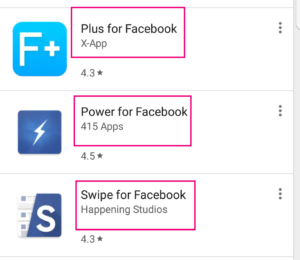You probably know to take care when downloading anything from the internet onto your computer, but we tend to talk a lot less about avoiding ‘dodgy’ phone apps. Just like files that you download onto your computer, apps can have harmful bits hidden in them that can attack your phone or invade your privacy. Here are a few ways to tell if an app is best avoided.
Google the name of the app developer before you download. If they have a professional website and a good portfolio of other trusted apps, then it’s likely to be safe to download.
Look carefully for the developer’s name in the app details as it could be deceptive. For example, the results shown here came up while searching for ‘Facebook’ on the Samsung Play Store. They are not necessarily harmful apps but, despite saying ‘Facebook’ in the name, were not developed by Facebook and should be looked at closely before downloading.
Reviews
Reading reviews can be useful. For example if they warn that the app is uselessly clogged with adverts, or if there are problems like crashing or freezing, this could indicate a low-quality app that’s best avoided if there is a better alternative.
A few bad reviews can be forgiven, but many more 1 star ratings than 4 or 5 stars should set off alarm bells. If there are very few reviews on an app then it’s also possible that other people are avoiding it for a reason!
What Info is Online?
The advice about avoiding apps with only a few reviews doesn’t always hold. Brand new apps, or ones that are designed for a smaller group of people (for example an app aimed at people in a particular profession) will likely have less views. Take a moment to Google the app to see if it’s been reviewed or discussed outside of the app store on a trustworthy site, such as a tech magazine.
T&Cs and App permissions
Ticking the box titled ‘I have read the terms and conditions’ is often a little white lie we tell when we don’t have time to read 17 pages of legal-speak! If you like a shortcut, there’s an interesting website called Terms of Service: Didn’t Read that summarises the T&Cs for many popular apps.
Apps will often ask you for permission to access or view data on your phone. For example, an app that you would naturally want to upload pictures to, such as Instagram, will naturally ask permission to access your camera and pictures. However apps that are used for gaming, planning, or shopping that ask for permission to use your camera are definitely out of the ordinary, so think twice before you click ‘yes’.
Keeping your phone free from dodgy apps is really just a case of doing a little bit of research and stopping to think before you hit the download button. If you feel like anything is off about the app, then don’t download it – we keep so much personal information on our phones that it’s really not worth the risk.








